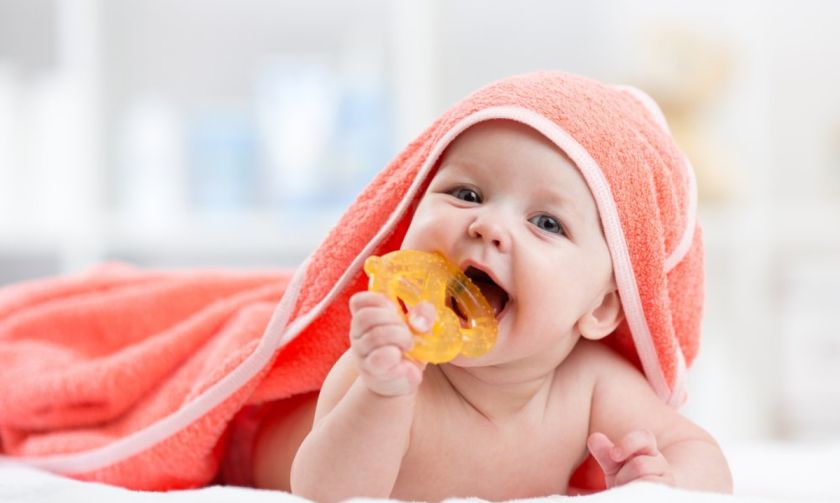
You’ve probably noticed everything your kid can get their hands on, including their feet, toys, your finger, and even your phone, end up in their mouth. A curious baby will take anything it can and put it in its mouth.
Why babies put everything in their mouths is a complex issue. Baby mouthing can be beneficial to your baby's health and is a typical stage of development.
The timing of infant mouthing as well as safety concerns to be aware of when it comes to your drooling young explorer are covered in further detail in this article.
By the time they can raise their hands to their mouths and chew on their fingers, babies can start mouthing by the time they are 4 months old. At six months, this tendency goes into overdrive, and your child will start mouthing just about anything they can get their hands on.
Babies' chubby little hands are mostly useful for gripping things and accidentally injuring themselves, unlike older kids and adults who can feel things with their palms and fingertips. They can't actually poke, squeeze, or massage something with their hands or fingers because they aren't yet fully grown.
The sensory nerves in their mouths and lips, on the other hand (pun intended), allow a baby to truly grasp the nature of an object. Therefore, your kid can sense through mouthing whether something is soft or firm, hairy or smooth, warm or cool.
Babies mouth constantly, thus they even lick the ground or other objects that are laying on it. They become more prone to being sick, and the best method to stop that is to practice good hygiene and keep the house clean. Make careful to keep the toys, floors, and all other areas your baby can touch clean.
Growing babies are almost constantly hungry, therefore your baby will examine every object to determine if it is sweet or edible. Fortunately, infants have powerful extrusion and gag responses. When kids are offered food with an unusual taste or texture, this is obvious.
Though initially, infants may also spit out foods that taste delicious, it's more probable that they will spew out anything awful. But when it comes to safety, it is definitely not a good idea to rely only on your reflexes.

Thankfully, we don't remember it, but experiencing constant gum pain and having all of our teeth erupt at once must have been incredibly terrible! Because of this, teething infants can become irritable. Another cause of baby mouthing is teething. When they are teething, your baby will put objects in their mouth and bite down on anything nearby, including you.
Baby mouthing is a typical stage of growth and can strengthen a baby's immune system. Baby-mouthing fosters learning and satisfies a child's innate curiosity.
It's generally safe, so don't discourage it. Of course, you still can't allow your child to eat just anything.
Make sure the infant doesn't access anything that they could choke on. This includes tough food that could break off and get stuck, as well as tough tiny toys or items. Additionally, sand and debris can get lodged in a baby's mouth and nose, making it harder for the infant to breathe or swallow.

While being safe and healthy for your pet, pet food can be dangerous for your unborn child. Certain pet meals include more chemicals and minerals than human food does. This may be harmful to people, especially young children.
Bacteria that can make newborns sick from food poisoning may also be present in pet food.
Every household has a variety of common items that are dangerous for anyone to eat or use as baby tethers. Some substances can potentially burn or irritate the mouth or sensitive skin of your infant.
Baby mouthing has advantages, thus it makes reasonable to encourage it in a secure way. Keep your infant engaged in activities or things that they can safely ingest. Give your baby plenty of mountable teething toys and age-appropriate soothing objects.
some examples of teething toys, include: Wooden or natural rubber tethers, teething brushes, teething mittens, and cool tethers

Your kid will undoubtedly locate it on the carpet, even if it's only a tiny vitamin or a piece of dried food that you can't see. Before letting your child explore the room if they are crawling, be sure to hoover the space.
First aid for choking and CPR for infants and young children are a little bit different, but anyone can learn how to do them! Encourage your partner or other careers to learn it as well by enrolling in a weekend session.
Keep all emergency contact information handy for anyone watching your child, both on your phone and on the refrigerator.
For both you and the baby, the brief mouthing phase can be turned into a safe exploration experience. The baby won't get sick from a little bit of dust and bacteria that cannot be avoided. Everything will be OK if you enjoy this phase and don't become overly obsessed or afraid of germs.